Nerine Dorman's Blog, page 57
October 1, 2014
Pretoria-based author debuts with epic fantasy
While South African authors are making waves with speculative fiction, it’s heartening to see yet another bring epic fantasy on the market. Dave-Brendon de Burgh joins the ranks with other South African authors such Greg Hamerton, Cat Hellisen and TC Southwell, who’ve all created magical worlds populated with unforgettable characters.
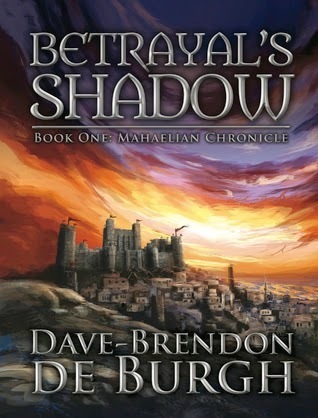 De Burgh’s debut novel, published this year by local small press Fox & Raven, submerges readers in a realm wracked by ancient conflict involving humans and the elf-like Elvayn, the latter which have been enslaved. As for what got De Burgh started as a storyteller, he shares: “Around that time that I read and finished Steven Erikson’s Memories of Ice, I put the book down, wiped my eyes again, and told myself that I wanted to and would be a story-teller.
De Burgh’s debut novel, published this year by local small press Fox & Raven, submerges readers in a realm wracked by ancient conflict involving humans and the elf-like Elvayn, the latter which have been enslaved. As for what got De Burgh started as a storyteller, he shares: “Around that time that I read and finished Steven Erikson’s Memories of Ice, I put the book down, wiped my eyes again, and told myself that I wanted to and would be a story-teller.
“I had passionate and accommodating English teachers in high school; one of the people I dedicated Betrayal’s Shadow to – Celeste Botes – let me daydream and write in class as long as I got the results in tests and exams. She never restricted me, and encouraged me to write – even though the stories I wrote back then were gruesome.
“I took part in a creative writing course which Random House Struik (at that time) and GetSmarter partnered on; I wanted to get a handle on the tale I wanted to tell, because I had more than a hundred thousand words already and hadn’t finished a single story. I was beginning to irritate myself, and I was losing hope that I would ever be able to finish writing a story, never mind complete a novel. So, taking part in that course really focused my mind and taught me about what constitutes a story or a tale.”
Like many fantasy authors, De Burgh grew up on many of the genre classics, which laid down fertile ground for the first story seeds that he cultivated.
“I’ve been reading epic fantasy since early high school,” he says, “and I knew I wanted to write a story that included the – for want of a better word – epic aspects of epic fantasy; the battles, the magic, political intrigues, complicated yet dramatic character-arcs, and worlds that are familiar yet different. I had been writing for eight or nine years before I began writing the novel, so there are many unfinished and scrapped scenes, even characters.”
Central to the conflict of his novel are his magical Elvayn, and De Burgh says that they are his answer to the standard elves found in the fantasy genre. “Particularly elves as they are portrayed on-screen,” he adds. “Seems a bit strange to tackle it that way, I know (instead of book-elves), but the visual aspects are what stick in most people’s memories. They are noticeably not human – so there’s no long, flowing hair and perfect features, and they also don’t use swords or shields or bows. They’re a philosophical people, more prone to think than to act.”
Apart from writing, De Burgh has been a bookseller since 2002 and his career has given him an advantage. He says: “Being a bookseller has taught me not only to identify trends in what people are reading but to also anticipate what they might like to read next. And being a bookseller forces you to explain a book’s plot to a browser without giving anything away – you want to hook them, get them to read a page or two, without making them feel as if you want them to buy the book.”
Like many authors, he faces daily challenges, like finding them time to write. De Burgh adds: “Even seeing my novel on the shelves every day doesn’t help my motivation; it’s very easy to want to relax after an eight-hour day at work, instead of making the time to sit down and write those thousand words. Also, ironically enough, reading can be a problem, but only if I read as a writer and not as a reader.”
Despite the current publishing industry operating in a state of flux, De Burgh remains positive on the role of small presses leading the way: “Smaller presses will definitely be the leaders when it comes to epic fantasy, science fiction, horror, and similar speculative fiction (specfic) genres. The fact of the matter is that the bigger guys don’t have specialists, or even specific imprints, that focus on specfic. South Africa doesn’t have its own Orbit, Tor, Gollancz or Del Rey; yet the book trade makes quite a bit of money from specfic titles. At the moment, specfic writers in South Africa have to deal with the mother of all Catch-22s – our tales aren’t published because there aren’t sales to base such an important decision on, but the writers can’t get those sales because their work isn’t published here.
“Lauren Beukes’s work is a good example of how strange our industry can be; although Moxyland was published by Jacana Media, the title didn’t really start gaining ground until Angry Robot (an excellent UK publisher) picked up the title. By the time Zoo City arrived, many more thousands of people were talking about Beukes’s work, and when The Shining Girls hit the industry, readers went nuts. Our industry seems to be reacting, not creating. Fox & Raven Publishing, Crystal Lake Publishing, Something Wicked and WordSmack (to name but a few) are the presses that are giving writers the chances, precisely because the bigger publishers don’t and aren’t equipped to do so.
“Our industry also needs to understand that finding South Africa’s Tolkien or Martin or Jordan isn’t the answer – we shouldn’t be looking for equivalents. We should be looking for tales that are well told and which showcase the talent and imagination of our writers, regardless of where those writers come from or which connections they do or don’t have – and the smaller presses are the only publishers who are doing this. The scale at which they operate is also smaller, more focused, so they’re able to keep prices relatively low, and unfortunately the book-buyer is buying less because prices are skyrocketing. So, where does the buyer look? Online. People are using their tablets and smart phones as ereaders, and the smaller presses are taking advantage of that while also doing all they can to get their books onto shelves in stores.”
(As appeared in the Pretoria News on September 29, 2014)
 De Burgh’s debut novel, published this year by local small press Fox & Raven, submerges readers in a realm wracked by ancient conflict involving humans and the elf-like Elvayn, the latter which have been enslaved. As for what got De Burgh started as a storyteller, he shares: “Around that time that I read and finished Steven Erikson’s Memories of Ice, I put the book down, wiped my eyes again, and told myself that I wanted to and would be a story-teller.
De Burgh’s debut novel, published this year by local small press Fox & Raven, submerges readers in a realm wracked by ancient conflict involving humans and the elf-like Elvayn, the latter which have been enslaved. As for what got De Burgh started as a storyteller, he shares: “Around that time that I read and finished Steven Erikson’s Memories of Ice, I put the book down, wiped my eyes again, and told myself that I wanted to and would be a story-teller.“I had passionate and accommodating English teachers in high school; one of the people I dedicated Betrayal’s Shadow to – Celeste Botes – let me daydream and write in class as long as I got the results in tests and exams. She never restricted me, and encouraged me to write – even though the stories I wrote back then were gruesome.
“I took part in a creative writing course which Random House Struik (at that time) and GetSmarter partnered on; I wanted to get a handle on the tale I wanted to tell, because I had more than a hundred thousand words already and hadn’t finished a single story. I was beginning to irritate myself, and I was losing hope that I would ever be able to finish writing a story, never mind complete a novel. So, taking part in that course really focused my mind and taught me about what constitutes a story or a tale.”
Like many fantasy authors, De Burgh grew up on many of the genre classics, which laid down fertile ground for the first story seeds that he cultivated.
“I’ve been reading epic fantasy since early high school,” he says, “and I knew I wanted to write a story that included the – for want of a better word – epic aspects of epic fantasy; the battles, the magic, political intrigues, complicated yet dramatic character-arcs, and worlds that are familiar yet different. I had been writing for eight or nine years before I began writing the novel, so there are many unfinished and scrapped scenes, even characters.”
Central to the conflict of his novel are his magical Elvayn, and De Burgh says that they are his answer to the standard elves found in the fantasy genre. “Particularly elves as they are portrayed on-screen,” he adds. “Seems a bit strange to tackle it that way, I know (instead of book-elves), but the visual aspects are what stick in most people’s memories. They are noticeably not human – so there’s no long, flowing hair and perfect features, and they also don’t use swords or shields or bows. They’re a philosophical people, more prone to think than to act.”
Apart from writing, De Burgh has been a bookseller since 2002 and his career has given him an advantage. He says: “Being a bookseller has taught me not only to identify trends in what people are reading but to also anticipate what they might like to read next. And being a bookseller forces you to explain a book’s plot to a browser without giving anything away – you want to hook them, get them to read a page or two, without making them feel as if you want them to buy the book.”
Like many authors, he faces daily challenges, like finding them time to write. De Burgh adds: “Even seeing my novel on the shelves every day doesn’t help my motivation; it’s very easy to want to relax after an eight-hour day at work, instead of making the time to sit down and write those thousand words. Also, ironically enough, reading can be a problem, but only if I read as a writer and not as a reader.”
Despite the current publishing industry operating in a state of flux, De Burgh remains positive on the role of small presses leading the way: “Smaller presses will definitely be the leaders when it comes to epic fantasy, science fiction, horror, and similar speculative fiction (specfic) genres. The fact of the matter is that the bigger guys don’t have specialists, or even specific imprints, that focus on specfic. South Africa doesn’t have its own Orbit, Tor, Gollancz or Del Rey; yet the book trade makes quite a bit of money from specfic titles. At the moment, specfic writers in South Africa have to deal with the mother of all Catch-22s – our tales aren’t published because there aren’t sales to base such an important decision on, but the writers can’t get those sales because their work isn’t published here.
“Lauren Beukes’s work is a good example of how strange our industry can be; although Moxyland was published by Jacana Media, the title didn’t really start gaining ground until Angry Robot (an excellent UK publisher) picked up the title. By the time Zoo City arrived, many more thousands of people were talking about Beukes’s work, and when The Shining Girls hit the industry, readers went nuts. Our industry seems to be reacting, not creating. Fox & Raven Publishing, Crystal Lake Publishing, Something Wicked and WordSmack (to name but a few) are the presses that are giving writers the chances, precisely because the bigger publishers don’t and aren’t equipped to do so.
“Our industry also needs to understand that finding South Africa’s Tolkien or Martin or Jordan isn’t the answer – we shouldn’t be looking for equivalents. We should be looking for tales that are well told and which showcase the talent and imagination of our writers, regardless of where those writers come from or which connections they do or don’t have – and the smaller presses are the only publishers who are doing this. The scale at which they operate is also smaller, more focused, so they’re able to keep prices relatively low, and unfortunately the book-buyer is buying less because prices are skyrocketing. So, where does the buyer look? Online. People are using their tablets and smart phones as ereaders, and the smaller presses are taking advantage of that while also doing all they can to get their books onto shelves in stores.”
(As appeared in the Pretoria News on September 29, 2014)
Published on October 01, 2014 12:08
September 30, 2014
Bellman & Black – A Ghost Story #review
Title:
Bellman & Black – A Ghost Story
Author: Diane Setterfield
Publisher: Orion Books, 2013
Reviewer: Nerine Dorman
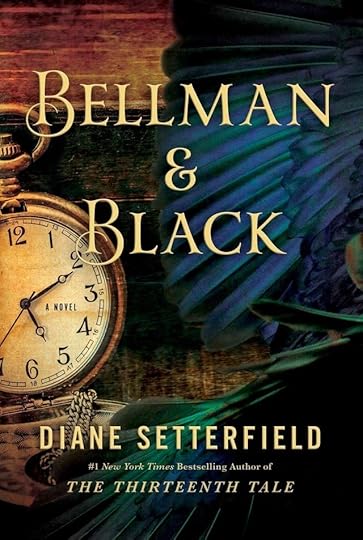 Don’t let the title of this story mislead you. If you’re in the mood for a spooky, ghostly thriller that will make you go to bed with your lights on, this is not the novel you are looking for. Bellman & Black is more an extended textured, vignette of a bygone era when Britain was at the height of its imperial powers and the British were obsessed with mourning.
Don’t let the title of this story mislead you. If you’re in the mood for a spooky, ghostly thriller that will make you go to bed with your lights on, this is not the novel you are looking for. Bellman & Black is more an extended textured, vignette of a bygone era when Britain was at the height of its imperial powers and the British were obsessed with mourning.
William Bellman is a dynamic force. From the moment that he takes aim with a catapult and strikes a rook dead at a seemingly impossible distance, his life is defined by precise calculations and risk-taking in business. He proves adept at getting things done efficiently while turning a profit. In fact, every moment of his life, to the last second, is plotted out, with very little room for self doubt.
The rooks frame his existence – birds that travel between this world and the next. They see the bigger picture Bellman doesn’t, while he builds first one business then the next. The birds watch and wait; they understand the inevitability of endings. Bellman spends his entire life ordering his existence yet there is one aspect over which he has no control – death.
The mysterious Mr Black, who may or may not be a figment of Bellman’s imagination, wafts in and out of Bellman’s life, at first noticed primarily at funerals. It is this enigmatic individual who inspires Bellman to expand his business ventures into a mourning emporium. Bellman’s industry is directly proportionate to the tragedy he has endured, and his inability to deal with emotions is quite sad, even if there is a kind of magic and artistry in his methods of establishing a business.
While this novel has no overarching plot, other than Bellman’s obsession with productivity – to the detriment of his relationships with others – there is a beauty in Diane Setterfield’s prose, and how she paints a multi-layered canvas populated with fascinating characters whose brief lives flit in and out between chapters.
At the novel’s conclusion, she holds up a mirror to the reader and we are presented with the inescapability of death. If you love stories filled with exquisite detail that evoke sights and sounds of a bygone era – from the inner running of a mill to finer points such as the jet beads used to decorate mourning couture, then by all means indulge in this masterpiece. Bellman & Black is the sort of story worth returning to, purely for its evocative visuals.
Author: Diane Setterfield
Publisher: Orion Books, 2013
Reviewer: Nerine Dorman
 Don’t let the title of this story mislead you. If you’re in the mood for a spooky, ghostly thriller that will make you go to bed with your lights on, this is not the novel you are looking for. Bellman & Black is more an extended textured, vignette of a bygone era when Britain was at the height of its imperial powers and the British were obsessed with mourning.
Don’t let the title of this story mislead you. If you’re in the mood for a spooky, ghostly thriller that will make you go to bed with your lights on, this is not the novel you are looking for. Bellman & Black is more an extended textured, vignette of a bygone era when Britain was at the height of its imperial powers and the British were obsessed with mourning.William Bellman is a dynamic force. From the moment that he takes aim with a catapult and strikes a rook dead at a seemingly impossible distance, his life is defined by precise calculations and risk-taking in business. He proves adept at getting things done efficiently while turning a profit. In fact, every moment of his life, to the last second, is plotted out, with very little room for self doubt.
The rooks frame his existence – birds that travel between this world and the next. They see the bigger picture Bellman doesn’t, while he builds first one business then the next. The birds watch and wait; they understand the inevitability of endings. Bellman spends his entire life ordering his existence yet there is one aspect over which he has no control – death.
The mysterious Mr Black, who may or may not be a figment of Bellman’s imagination, wafts in and out of Bellman’s life, at first noticed primarily at funerals. It is this enigmatic individual who inspires Bellman to expand his business ventures into a mourning emporium. Bellman’s industry is directly proportionate to the tragedy he has endured, and his inability to deal with emotions is quite sad, even if there is a kind of magic and artistry in his methods of establishing a business.
While this novel has no overarching plot, other than Bellman’s obsession with productivity – to the detriment of his relationships with others – there is a beauty in Diane Setterfield’s prose, and how she paints a multi-layered canvas populated with fascinating characters whose brief lives flit in and out between chapters.
At the novel’s conclusion, she holds up a mirror to the reader and we are presented with the inescapability of death. If you love stories filled with exquisite detail that evoke sights and sounds of a bygone era – from the inner running of a mill to finer points such as the jet beads used to decorate mourning couture, then by all means indulge in this masterpiece. Bellman & Black is the sort of story worth returning to, purely for its evocative visuals.
Published on September 30, 2014 10:29
September 29, 2014
Shadow on the Crown by Patricia Bracewell #review
Title:
Shadow on the Crown
Author: Patricia Bracewell
Publisher: HarperCollins, 2013
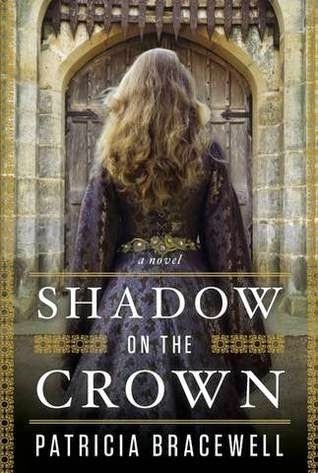 Of all the fates Emma of Normandy imagined, the last she expected was that she would marry an English king and have to cross the Narrow Sea to live in England. The year is 1002 and Europe is a dangerous place, largely thanks to the Danish Vikings who often raid up and down the coast, but also due to the murky politics this young woman finds herself immersed in once she joins King Æthelred’s court.
Of all the fates Emma of Normandy imagined, the last she expected was that she would marry an English king and have to cross the Narrow Sea to live in England. The year is 1002 and Europe is a dangerous place, largely thanks to the Danish Vikings who often raid up and down the coast, but also due to the murky politics this young woman finds herself immersed in once she joins King Æthelred’s court.
Life is anything but simple for the young queen, who faces many challenges once she is crowned. Emma is trapped in a loveless marriage to a tormented, much-older man, whose bad decisions will have severe ramifications to his kingdom. In addition, she also discovers a potential rival for her crown, who will stop at nothing to get what she wants. Emma’s situation is not helped by the fact that she is not King Æthelred’s first wife, and any child she brings into the world will be viewed as a contender for the throne, as the king as older sons who are nearly adult. If that is not enough, there’s a whiff of a forbidden love – and Patricia Bracewell stirs up a heady mixture of danger of intrigue.
Shadow on the Crown engaged me from the very first page, with a well-realised setting and a large, varied cast of lively characters who were often deliciously at cross purposes.
Bracewell breathes life into the history of a fascinating queen whose reign is so eventful it seems almost unreal, and definitely deserves the detailed narrative treatment she gives Emma’s story. At a time when women had few, if any rights, Emma wasn’t afraid to grasp and hold power, proving that she was a worthy and canny ruler in her own right. This is a story is a solid, historical read that makes you forget you’ve a book in your hands – and I eagerly await the next instalment.
Author: Patricia Bracewell
Publisher: HarperCollins, 2013
 Of all the fates Emma of Normandy imagined, the last she expected was that she would marry an English king and have to cross the Narrow Sea to live in England. The year is 1002 and Europe is a dangerous place, largely thanks to the Danish Vikings who often raid up and down the coast, but also due to the murky politics this young woman finds herself immersed in once she joins King Æthelred’s court.
Of all the fates Emma of Normandy imagined, the last she expected was that she would marry an English king and have to cross the Narrow Sea to live in England. The year is 1002 and Europe is a dangerous place, largely thanks to the Danish Vikings who often raid up and down the coast, but also due to the murky politics this young woman finds herself immersed in once she joins King Æthelred’s court.Life is anything but simple for the young queen, who faces many challenges once she is crowned. Emma is trapped in a loveless marriage to a tormented, much-older man, whose bad decisions will have severe ramifications to his kingdom. In addition, she also discovers a potential rival for her crown, who will stop at nothing to get what she wants. Emma’s situation is not helped by the fact that she is not King Æthelred’s first wife, and any child she brings into the world will be viewed as a contender for the throne, as the king as older sons who are nearly adult. If that is not enough, there’s a whiff of a forbidden love – and Patricia Bracewell stirs up a heady mixture of danger of intrigue.
Shadow on the Crown engaged me from the very first page, with a well-realised setting and a large, varied cast of lively characters who were often deliciously at cross purposes.
Bracewell breathes life into the history of a fascinating queen whose reign is so eventful it seems almost unreal, and definitely deserves the detailed narrative treatment she gives Emma’s story. At a time when women had few, if any rights, Emma wasn’t afraid to grasp and hold power, proving that she was a worthy and canny ruler in her own right. This is a story is a solid, historical read that makes you forget you’ve a book in your hands – and I eagerly await the next instalment.
Published on September 29, 2014 11:24
September 25, 2014
A Shadow on the Skin by Keren Gilfoyle #review #fantasy
Title:
A Shadow on the Skin
Author: Keren Gilfoyle
Publisher: Headline Book Publishing, 1993
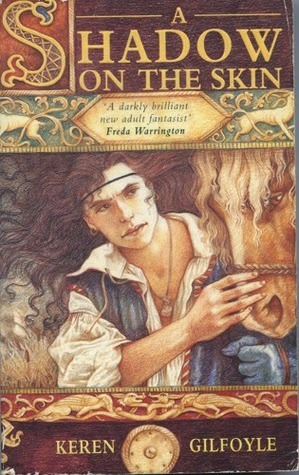 Sometimes I pick up a novel in a secondhand bookstore that just begs to be part of my permanent collection, and A Shadow on the Skin is one of those. I’m also going to put a huge-ass disclaimer at the start of this review by stating that this novel is not going to appeal to a broad readership. Rather, if you enjoyed the likes of Mary Gentle, Storm Constantine, Tanith Lee and CJ Cherryh, then you’re probably going to be right at home. Oh, and another sticking point that might put off sensitive readers: incest. A fair bit of it. Some of it quite graphic.
Sometimes I pick up a novel in a secondhand bookstore that just begs to be part of my permanent collection, and A Shadow on the Skin is one of those. I’m also going to put a huge-ass disclaimer at the start of this review by stating that this novel is not going to appeal to a broad readership. Rather, if you enjoyed the likes of Mary Gentle, Storm Constantine, Tanith Lee and CJ Cherryh, then you’re probably going to be right at home. Oh, and another sticking point that might put off sensitive readers: incest. A fair bit of it. Some of it quite graphic.
Okay, the incest serves mainly to paint out the decadence of the Desaighnes Family. They claim to not be human, thanks to their magical Inheritance, but I suspect that’s just generations of them giving themselves airs and graces talking. The Desaighnes hold a large territory known only as the Dominion, complete with slaves, but as one can imagine, the rot has long set in, and the mafia-like Family is fading.
Generations of inbreeding, in an attempt to preserve racial purity – and magical powers – has instead resulted in a few stunted individuals unable to live up to the standards of the last-remaining Great One, Halenne.
Up until recently, the Desaighnes had a policy of not allowing any of their halfblood offspring to live, but for a twist of fate, Tobias and his siblings, Nikleis and Bekhet, have been allowed to grow into adulthood.
Nikleis and Bekhet have been raised as Family, among the Desaighnes, while Tobias has been raised by his mother, a hostage princess. Consequently, he has rejected the Desaighnes ways and hankers after a homeland he has never seen.
Despite his mother being held a virtual prisoner, Tobias has been running wild, and has an entire life – and young family – in the forbidding fenlands near the Desaighnes residence, among the heron tribe.
Little does he know that the Old Woman of the heron tribe is tolerating his presence for more sinister purposes – for the magic flowing through his veins. To her he is little more than a convenient stud, to breed gifted offspring to eventually raise the fen-folk’s stature. The Old Woman wishes for girls to continue and strengthen her legacy.
Added to the mix are the sinister and mysterious fetch lights and the larger litch fires – beings of magical energy – that also tie in with their magic. I get the idea that Keren Gilfoyle would have developed this further had she continued with the series, but it was a lovely exploration.
The basic premise of this novel is an attempted political takeover by the Family once they realise they need to unblock their halfblood scions’ Inheritance. As in the nature of any young predators, there is competition between the three as they jostle for supremacy (granted, not so much from Tobias, whose main aim is escape, pure and simple).
Tobias wants only to free his mother and return her to her home. Their love for each other borders almost on the obsessive, but given the circumstances, this is easy to understand. Tobias’s mother clings to her youngest, especially after suffering years of abuse from her now mercifully deceased husband.
Nikleis hates Tobias with an unrelenting passion, and sees his youngest sibling as an obstacle in his path keeping him from his mother’s affections. He has a massive inferiority complex thanks to his complicated upbringing among the Desaighnes – and up until now feels that he has not been allowed the opportunity to prove himself.
Bekhet’s love for Tobias is more than sisterly, and the more Tobias spurns her dubious affections, the more she throws herself at him. She has suffered a lot of abuse from the Desaighnes, which has left her emotionally stunted. That’s not to say that she’s stupid – far from it; of all the children, Bekhet is perhaps the most cunning, which makes her all the more dangerous when underestimated.
Tobias must struggle to free his mother and sister from the scheming Desaighnes, whose corruption taints everything it touches. And his journey becomes all the more fraught, as not only must he come to terms with his own burgeoning powers, but he must learn to accept himself for who and what he is in order to stop his power-hungry relatives.
Gilfoyle’s world-building, although dizzying at times with the quantity and variety of names and places, made this novel for me, from the vivid descriptions of clothing and architecture, down to the untamed fens. The setting is almost tangible, and I forgot I was even holding a book. Another thing that is clear is the author’s great love and understanding of horses. They aren’t just commodities, as in so many other fantasy sagas.
The only serious criticism I can level against A Shadow on the Skin is that there are a number of new characters introduced near the end who were clearly intended to take on more prominent roles later. Likewise, there are story arcs begging for closure, or further development, even though Gilfoyle does conclude the more important ones so that this novel can stand on its own.
A Shadow on the Skin is filled with drama, magic and intrigue, in a well-realised setting that begs for further exploration.
Keren, if you ever read this review, please consider returning to your world and your craft, and continue telling this story. It is magnificent, and now that I’ve had a taste of your magic, I need more.
Author: Keren Gilfoyle
Publisher: Headline Book Publishing, 1993
 Sometimes I pick up a novel in a secondhand bookstore that just begs to be part of my permanent collection, and A Shadow on the Skin is one of those. I’m also going to put a huge-ass disclaimer at the start of this review by stating that this novel is not going to appeal to a broad readership. Rather, if you enjoyed the likes of Mary Gentle, Storm Constantine, Tanith Lee and CJ Cherryh, then you’re probably going to be right at home. Oh, and another sticking point that might put off sensitive readers: incest. A fair bit of it. Some of it quite graphic.
Sometimes I pick up a novel in a secondhand bookstore that just begs to be part of my permanent collection, and A Shadow on the Skin is one of those. I’m also going to put a huge-ass disclaimer at the start of this review by stating that this novel is not going to appeal to a broad readership. Rather, if you enjoyed the likes of Mary Gentle, Storm Constantine, Tanith Lee and CJ Cherryh, then you’re probably going to be right at home. Oh, and another sticking point that might put off sensitive readers: incest. A fair bit of it. Some of it quite graphic.Okay, the incest serves mainly to paint out the decadence of the Desaighnes Family. They claim to not be human, thanks to their magical Inheritance, but I suspect that’s just generations of them giving themselves airs and graces talking. The Desaighnes hold a large territory known only as the Dominion, complete with slaves, but as one can imagine, the rot has long set in, and the mafia-like Family is fading.
Generations of inbreeding, in an attempt to preserve racial purity – and magical powers – has instead resulted in a few stunted individuals unable to live up to the standards of the last-remaining Great One, Halenne.
Up until recently, the Desaighnes had a policy of not allowing any of their halfblood offspring to live, but for a twist of fate, Tobias and his siblings, Nikleis and Bekhet, have been allowed to grow into adulthood.
Nikleis and Bekhet have been raised as Family, among the Desaighnes, while Tobias has been raised by his mother, a hostage princess. Consequently, he has rejected the Desaighnes ways and hankers after a homeland he has never seen.
Despite his mother being held a virtual prisoner, Tobias has been running wild, and has an entire life – and young family – in the forbidding fenlands near the Desaighnes residence, among the heron tribe.
Little does he know that the Old Woman of the heron tribe is tolerating his presence for more sinister purposes – for the magic flowing through his veins. To her he is little more than a convenient stud, to breed gifted offspring to eventually raise the fen-folk’s stature. The Old Woman wishes for girls to continue and strengthen her legacy.
Added to the mix are the sinister and mysterious fetch lights and the larger litch fires – beings of magical energy – that also tie in with their magic. I get the idea that Keren Gilfoyle would have developed this further had she continued with the series, but it was a lovely exploration.
The basic premise of this novel is an attempted political takeover by the Family once they realise they need to unblock their halfblood scions’ Inheritance. As in the nature of any young predators, there is competition between the three as they jostle for supremacy (granted, not so much from Tobias, whose main aim is escape, pure and simple).
Tobias wants only to free his mother and return her to her home. Their love for each other borders almost on the obsessive, but given the circumstances, this is easy to understand. Tobias’s mother clings to her youngest, especially after suffering years of abuse from her now mercifully deceased husband.
Nikleis hates Tobias with an unrelenting passion, and sees his youngest sibling as an obstacle in his path keeping him from his mother’s affections. He has a massive inferiority complex thanks to his complicated upbringing among the Desaighnes – and up until now feels that he has not been allowed the opportunity to prove himself.
Bekhet’s love for Tobias is more than sisterly, and the more Tobias spurns her dubious affections, the more she throws herself at him. She has suffered a lot of abuse from the Desaighnes, which has left her emotionally stunted. That’s not to say that she’s stupid – far from it; of all the children, Bekhet is perhaps the most cunning, which makes her all the more dangerous when underestimated.
Tobias must struggle to free his mother and sister from the scheming Desaighnes, whose corruption taints everything it touches. And his journey becomes all the more fraught, as not only must he come to terms with his own burgeoning powers, but he must learn to accept himself for who and what he is in order to stop his power-hungry relatives.
Gilfoyle’s world-building, although dizzying at times with the quantity and variety of names and places, made this novel for me, from the vivid descriptions of clothing and architecture, down to the untamed fens. The setting is almost tangible, and I forgot I was even holding a book. Another thing that is clear is the author’s great love and understanding of horses. They aren’t just commodities, as in so many other fantasy sagas.
The only serious criticism I can level against A Shadow on the Skin is that there are a number of new characters introduced near the end who were clearly intended to take on more prominent roles later. Likewise, there are story arcs begging for closure, or further development, even though Gilfoyle does conclude the more important ones so that this novel can stand on its own.
A Shadow on the Skin is filled with drama, magic and intrigue, in a well-realised setting that begs for further exploration.
Keren, if you ever read this review, please consider returning to your world and your craft, and continue telling this story. It is magnificent, and now that I’ve had a taste of your magic, I need more.
Published on September 25, 2014 11:55
September 22, 2014
Take a Trip to the Downside with SL Grey #review #interview
 Nothing is sacred to writing duo Sarah Lotz and Louis Greenberg – also known by their pen name SL Grey – who’ve brought us the highly entertaining, horror-themed Downside trilogy that engages a darker view of traditional settings that already hold more than enough horror. The Mall and The Ward took a stab at consumer culture and the South African medical system respectively, and in The New Girl, they allow their imaginations to run amok in a setting inspired by the school of your nightmares.
Nothing is sacred to writing duo Sarah Lotz and Louis Greenberg – also known by their pen name SL Grey – who’ve brought us the highly entertaining, horror-themed Downside trilogy that engages a darker view of traditional settings that already hold more than enough horror. The Mall and The Ward took a stab at consumer culture and the South African medical system respectively, and in The New Girl, they allow their imaginations to run amok in a setting inspired by the school of your nightmares.Though one might be tempted to wonder whether their own experiences provided inspiration, Greenberg says: “My high school was a grim, faux-Victorian boys’ school, so it might have been cathartic to set horror stories there, but we felt that a wannabe-gothic school would be a rather clichéd setting and decided, as we have throughout the series, to set it in a modern school whose abusiveness hides behind its clean, moral veneer.”
What set book three apart from books one and two is that this time the authors added the viewpoints of Downsider, who inhabit a shadowy world that exists as a dark reflection of ours, which offered a revealing glimpse into the lives of these rather macabre creatures.
Greenberg says that they didn’t want to write the same book as The Mall or The Ward and “the logic of the downside developed in The Ward and the next step was to turn the tables and allow readers to understand it from a downsider’s perspective.”
 Of course the downsiders don’t quite “get” our culture at all, which results in their often humours appropriations of names and objects. Greenberg elaborates: “The denizens of The Mall are brutally honest –much more than upsiders – and that first came across in their shop names and in their marketing. It was so much fun that that sort of expression became a trademark of the downsiders, and part of the writing that we always looked forward to. My favourite parts in The New Girl are when some of the halfpints in class tell their teacher what they’d do to a brown who tried to threaten them. And the names Sarah came up with for some of the secondary downsiders, like Cardineal Phelgm, are classic.”
Of course the downsiders don’t quite “get” our culture at all, which results in their often humours appropriations of names and objects. Greenberg elaborates: “The denizens of The Mall are brutally honest –much more than upsiders – and that first came across in their shop names and in their marketing. It was so much fun that that sort of expression became a trademark of the downsiders, and part of the writing that we always looked forward to. My favourite parts in The New Girl are when some of the halfpints in class tell their teacher what they’d do to a brown who tried to threaten them. And the names Sarah came up with for some of the secondary downsiders, like Cardineal Phelgm, are classic.”Since The New Girl’s release, both Lotz and Greenberg have gone on to celebrate the release of solo novels. Lotz’s much-lauded The Three, has recently received mention from no less than Stephen King; and Greenberg’s Dark Window has also garnered favourable reviews.
Greenberg says: “Sarah and I bring quite different skills to the collaboration, so it would be an interesting exercise to see both of our solo work and see how it differs from SL Grey, and how SL Grey combines our styles. I’ve also expanded vastly as a writer from working with Sarah, who gives me great hands-on practice at the aspects of storytelling I hadn’t practised so much before.”
Lotz adds: “I wouldn't have been able to pull off my latest solo novel without the experience I gained from working with Louis. It’s been a steep and rewarding learning curb. And I urge everyone to pick up a copy of his genre-busting, bloody brilliant latest novel, which deserves every bit of the praise it’s getting.”
Greenberg concludes: “I’m one of the legions of The Three fankids. I was lucky enough to read it in manuscript last year and I was thoroughly impressed, a little jealous and a lot inspired that she could write such a focused, sustained, original and riveting novel with her trademark plot brilliance and chameleonic empathy and voice.”
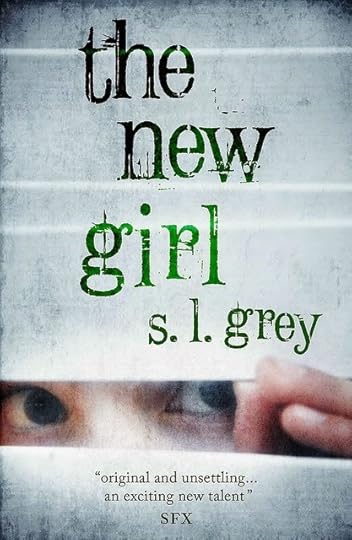
Title: The New Girl
Author: SL Grey
Publisher: Corvus Books, 2013
Truth be told, I don’t find the SL Grey books all that scary. Unsettling, yes. Disturbing, definitely, but in all the right ways possible. But, they’re highly entertaining if you’re not too squeamish when it comes to dark fiction with a twist of body horror.
The Downside books are the mutated brainchild of two of SA’s established voices in horror – Sarah Lotz (author of the widely acclaimed The Three) and Louis Greenberg (who has recently seen the release of his novel Dark Windows).
What the two started in their first foray into collaborative writing, The Mall, they’ve carried through with The Ward, book two, and have now concluded in book three. And, while you needn’t read all the books in chronological order, you will possibly pick up more of the references to the other instalments if you do.
Where The Mall takes a left hook at our consumerist culture, and The Ward examines the horrors of our hospital system, The New Girl slashes at South Africa’s private schools. Once again, the inhabitants of the Downside allow us to view a dark distortion of our contemporary lifestyle through their lens.
The results are simultaneously hilarious and uncomfortable, and by the third book, the blend between Lotz and Greenberg’s writing is seamless.
We meet Tara, an American woman obsessed with Reborn dolls, which are toys that have been modified to make them seem like real babies. The other primary character is Ryan, who is difficult to like due to his being a sexual predator pretty much begging for the signature SL Grey “Downside” just deserts.
What makes The New Girl different from its predecessors is that inhabitants from Downside are also employed as viewpoint characters, which gives readers the opportunity to see a behind-the-scenes slice of life from the perspective of these somewhat macabre individuals. Jane and Penter are unpleasant, yet one can’t help but feel a strange affection for them and their predicaments as they make the best of their situation. Their attempts to understand our world result in numerous darkly humorous situations. This touch from the authors was unexpected, yet added much depth to the novel, which otherwise might have followed the expected dual-viewpoint template.
At this stage, I must add, that SL Grey is perhaps one of the few names to have had me laugh out loud while reading – and have my fellow passengers on the train shift to a seat further away from my evil cackling. Well done, to these master storytellers.
Published on September 22, 2014 11:58
September 20, 2014
Fantasy Rocks, with Fox & Raven
On Thursday I bestirred myself and [gasp] actually went out after work. And on a school night too, can you believe it? But I had good cause, because a) not only was it Open Book Cape Town 2014, but one of South Africa's new, and totally fab SFF publishers, Fox & Raven, was hosting three awesome authors in the fantasy genre at the Fugard Theatre.

Marius du Plessis (Fox & Raven) chatted to the legendary Raymond E Feist, Mike Carey and South Africa's own Dave-Brendon de Burgh about fantasy, and mostly about world-building, which I admit is one of the main reasons why I love the genre so much.
For those of you not in the know, Raymond is the author of a hugely successful Riftwar Cycle , which has been one of the pillars in the genre for many years. Folks who know their comics will be no stranger to Mike's work, but at the moment he's making a huge splash with a novel entitled The Girl with all the Gifts . Those of you who've been following social media in the bookish circles, will no doubt have encountered Betrayal's Shadow , a really solid start to what promises to be a popular fantasy series by the man.
So, I was totally excited to be privy to the panel discussion on Thursday, and even live-Tweeted the event. For posterity, I've recorded the top comments by the panel...
Raymond: You are better at writing what you love than anyone else on the planet.
Raymond: World building is vital. It has to make sense. Readers will accept the improbable but not the impossible.
Raymond: My father said you've got to give the audience someone to root for.
Mike: There's a sense that the barricades have come down [about genre fiction in general]
Mike: Publishers would send me rejection letters that were basically "Hahahahahaa" [Mike, on his initial experiences trying to get published]
Raymond: It's about trusting your reader's intelligence.
Dave: Everything I know I get from reading. The more widely read you are the more it unlocks your author voice.
Dave: The best writing happens when everything around you disappears.
Dave: Write for yourself. If you write for yourself, you are already unique in what you're doing.
Raymond: That's when you find yourself dancing around your room like a moron yelling "God I'm good!" [On the excitement of really getting in the writing "zone"]
Raymond: No matter who influenced us, we still have unique voices.
Raymond: You don't need to be an expert, you just need to convince the readers you know what you're writing about.
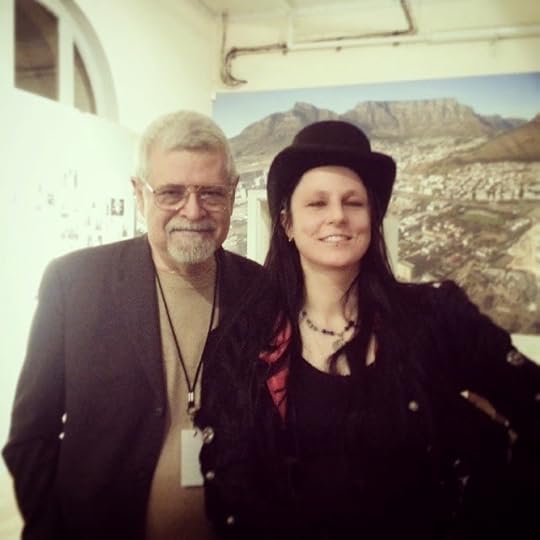 The kernel of the discussion was overwhelmingly positive, with the message to all authors, whether they're aspiring or established, that the field is basically wide open. Never before have so many opportunities existed for authors to take advantage of. Authors are encouraged to read widely, and to love their genre, and not be afraid to experiment and put their own stamp on what they love.
The kernel of the discussion was overwhelmingly positive, with the message to all authors, whether they're aspiring or established, that the field is basically wide open. Never before have so many opportunities existed for authors to take advantage of. Authors are encouraged to read widely, and to love their genre, and not be afraid to experiment and put their own stamp on what they love.
I overheard one gentleman say that this panel had encouraged him to pick up his writing again,
which I find deeply exciting. So, a huge thank you to Marius, Raymond, Mike and Dave, for this inspiring evening. I know I'm fired up to create more words and to love my chosen genres all the more.

Marius du Plessis (Fox & Raven) chatted to the legendary Raymond E Feist, Mike Carey and South Africa's own Dave-Brendon de Burgh about fantasy, and mostly about world-building, which I admit is one of the main reasons why I love the genre so much.
For those of you not in the know, Raymond is the author of a hugely successful Riftwar Cycle , which has been one of the pillars in the genre for many years. Folks who know their comics will be no stranger to Mike's work, but at the moment he's making a huge splash with a novel entitled The Girl with all the Gifts . Those of you who've been following social media in the bookish circles, will no doubt have encountered Betrayal's Shadow , a really solid start to what promises to be a popular fantasy series by the man.
So, I was totally excited to be privy to the panel discussion on Thursday, and even live-Tweeted the event. For posterity, I've recorded the top comments by the panel...
Raymond: You are better at writing what you love than anyone else on the planet.
Raymond: World building is vital. It has to make sense. Readers will accept the improbable but not the impossible.
Raymond: My father said you've got to give the audience someone to root for.
Mike: There's a sense that the barricades have come down [about genre fiction in general]
Mike: Publishers would send me rejection letters that were basically "Hahahahahaa" [Mike, on his initial experiences trying to get published]
Raymond: It's about trusting your reader's intelligence.
Dave: Everything I know I get from reading. The more widely read you are the more it unlocks your author voice.
Dave: The best writing happens when everything around you disappears.
Dave: Write for yourself. If you write for yourself, you are already unique in what you're doing.
Raymond: That's when you find yourself dancing around your room like a moron yelling "God I'm good!" [On the excitement of really getting in the writing "zone"]
Raymond: No matter who influenced us, we still have unique voices.
Raymond: You don't need to be an expert, you just need to convince the readers you know what you're writing about.
 The kernel of the discussion was overwhelmingly positive, with the message to all authors, whether they're aspiring or established, that the field is basically wide open. Never before have so many opportunities existed for authors to take advantage of. Authors are encouraged to read widely, and to love their genre, and not be afraid to experiment and put their own stamp on what they love.
The kernel of the discussion was overwhelmingly positive, with the message to all authors, whether they're aspiring or established, that the field is basically wide open. Never before have so many opportunities existed for authors to take advantage of. Authors are encouraged to read widely, and to love their genre, and not be afraid to experiment and put their own stamp on what they love.I overheard one gentleman say that this panel had encouraged him to pick up his writing again,
which I find deeply exciting. So, a huge thank you to Marius, Raymond, Mike and Dave, for this inspiring evening. I know I'm fired up to create more words and to love my chosen genres all the more.
Published on September 20, 2014 00:27
September 17, 2014
Arcadia's Gift by Jesi Lea Ryan #review #ya #contemporary #fantasy
Title:
Arcadia’s Gift (Arcadia Trilogy #1)
Author: Jesi Lea Ryan, 2012
 Arcadia (Cady) and Avalon Day are twin sisters, and their family – although under strain with their parents’ separation – is a typical American family. The girls face all the usual trials and tribulations one can expect for their age – school, friends, boys. Everything seems on track until Cady’s sister dies in a tragic accident, irrevocably throwing the surviving twin’s life out of kilter.
Arcadia (Cady) and Avalon Day are twin sisters, and their family – although under strain with their parents’ separation – is a typical American family. The girls face all the usual trials and tribulations one can expect for their age – school, friends, boys. Everything seems on track until Cady’s sister dies in a tragic accident, irrevocably throwing the surviving twin’s life out of kilter.
Not only must Cady deal with the grief, but she finds herself being the strong one in her family when her mother falls into the bleakest of depressions. Added to that is Cady’s discovery that she is an empath, which brings with it other, less pleasant developments when she discovers that she is at the mercy of everyone else’s emotions in addition to her own.
A new boy at school, Bryan, offers a glimmer of hope – as do Cady’s friends – and Cady is not along as she tries to come to terms with how her circumstances have changed. Despite all the difficulties, she comes across as a generally happy and spirited teen, and she’s willing to face her challenges despite the hurt.
Arcadia’s Gift by Jesi Lea Ryan is the first book in what looks like a series. It’s slow paced but thorough, and Ryan has used this to good purpose in order to build a solid setting populated by characters who feel authentic, and who have to deal with real issues.
What I especially enjoyed about the story was Ryan’s understanding of death, and the way the grieving process can cast a pall over a person’s life. Also, she approached the supernatural elements in the story in a manner that felt plausible. Actions have consequences, and though I could see where Ryan was headed with certain premises, the execution was nonetheless satisfying, even though it wasn’t overly dramatic as in “we’re going to save the world from itself” epic. Which is also fine. Sometimes heroes don’t need to move mountains, but work quiet miracles among the people they love.
While Arcadia’s Gift does take a while to get off the ground – and this clearly the author laying groundwork – I nonetheless enjoyed the story. Ryan has a light yet engaging tone, and she writes with a great love for her characters and subject matter, and I can imagine that this story will appeal to those who enjoyed all the obvious bestsellers in the YA paranormal/urban fantasy genres.
Author: Jesi Lea Ryan, 2012
 Arcadia (Cady) and Avalon Day are twin sisters, and their family – although under strain with their parents’ separation – is a typical American family. The girls face all the usual trials and tribulations one can expect for their age – school, friends, boys. Everything seems on track until Cady’s sister dies in a tragic accident, irrevocably throwing the surviving twin’s life out of kilter.
Arcadia (Cady) and Avalon Day are twin sisters, and their family – although under strain with their parents’ separation – is a typical American family. The girls face all the usual trials and tribulations one can expect for their age – school, friends, boys. Everything seems on track until Cady’s sister dies in a tragic accident, irrevocably throwing the surviving twin’s life out of kilter.Not only must Cady deal with the grief, but she finds herself being the strong one in her family when her mother falls into the bleakest of depressions. Added to that is Cady’s discovery that she is an empath, which brings with it other, less pleasant developments when she discovers that she is at the mercy of everyone else’s emotions in addition to her own.
A new boy at school, Bryan, offers a glimmer of hope – as do Cady’s friends – and Cady is not along as she tries to come to terms with how her circumstances have changed. Despite all the difficulties, she comes across as a generally happy and spirited teen, and she’s willing to face her challenges despite the hurt.
Arcadia’s Gift by Jesi Lea Ryan is the first book in what looks like a series. It’s slow paced but thorough, and Ryan has used this to good purpose in order to build a solid setting populated by characters who feel authentic, and who have to deal with real issues.
What I especially enjoyed about the story was Ryan’s understanding of death, and the way the grieving process can cast a pall over a person’s life. Also, she approached the supernatural elements in the story in a manner that felt plausible. Actions have consequences, and though I could see where Ryan was headed with certain premises, the execution was nonetheless satisfying, even though it wasn’t overly dramatic as in “we’re going to save the world from itself” epic. Which is also fine. Sometimes heroes don’t need to move mountains, but work quiet miracles among the people they love.
While Arcadia’s Gift does take a while to get off the ground – and this clearly the author laying groundwork – I nonetheless enjoyed the story. Ryan has a light yet engaging tone, and she writes with a great love for her characters and subject matter, and I can imagine that this story will appeal to those who enjoyed all the obvious bestsellers in the YA paranormal/urban fantasy genres.
Published on September 17, 2014 11:48
September 16, 2014
Featured author: Alisse Lee Goldeberg
 A big welcome to today's featured author, Alisse Lee Goldenberg, who is an author of horror and young adult fantasy fiction. She has her bachelors of education and a fine arts degree, and has studied fantasy and folk lore since she was a child. Alisse lives in Toronto with her husband Brian, their triplets Joseph, Phillip, and Hailey, and their rambunctious Goldendoodle Sebastian.
A big welcome to today's featured author, Alisse Lee Goldenberg, who is an author of horror and young adult fantasy fiction. She has her bachelors of education and a fine arts degree, and has studied fantasy and folk lore since she was a child. Alisse lives in Toronto with her husband Brian, their triplets Joseph, Phillip, and Hailey, and their rambunctious Goldendoodle Sebastian.Find Alisse on her website, and Twitter.
About The Dybbuk's Mirror:
It has been nearly two years since the events in The Strings of the Violin, and Carrie has adjusted to life as a university student far from her friends. However, when the path to Hadariah is sealed, she starts to fear malevolent forces may be behind the other strange occurrences around her. Trying to contact Lindsay and Rebecca to get help in unraveling the mystery, Carrie discovers that her friends are in fact missing. With no way of knowing who to trust, Carrie must find a way back to the land she once saved to rescue her friends from the dybbuks’ clutches.
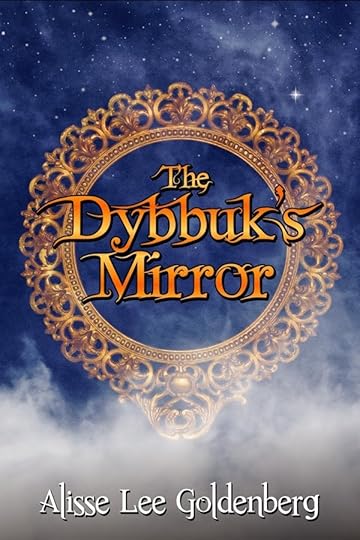 Reuniting with the dybbuk princess Emilia, and finding a new friend in the mysterious farmer Mikhail, Carrie must once again do battle with Asmodeus’s forces, and help stop the chaos that threatens to overtake the land while striving to save both Lindsay and Rebecca. For the first time, Carrie is working without the two friends who have helped her through every major decision in her life. Carrie must learn to rely on herself, and find her own strengths to save those she holds dear.
Reuniting with the dybbuk princess Emilia, and finding a new friend in the mysterious farmer Mikhail, Carrie must once again do battle with Asmodeus’s forces, and help stop the chaos that threatens to overtake the land while striving to save both Lindsay and Rebecca. For the first time, Carrie is working without the two friends who have helped her through every major decision in her life. Carrie must learn to rely on herself, and find her own strengths to save those she holds dear.Genre classification: YA Fantasy
200-word excerpt from The Strings of the Violin
Carrie stared at the small collection of leaves. How could she possibly fit through that? She hesitated, and one of her hands sought her necklace. She gave a small shrug and got down on all fours. As she approached the bush she heard her dog barking hysterically from the house. “Bye, Finn,” she whispered and crawled forward.
Was she shrinking? Was the bush getting larger? Whatever was happening, it was clearly magic. Carrie crawled onward. Branches and leaves caught in her hair, tore at her pack. The tunnel (for she was now sure there was a tunnel in that collection of twigs) seemed to go on forever. Carrie was keenly aware of everything around her. Her eyes sharply saw each leaf in stark detail, the way the light filtered through the holes in the foliage and dappled everything in a mossy green. She heard every breaking branch under her knees and hands with a sharp, resounding crack that seemed to stab the silence in the air around her. She felt their sharp ends scratch her hands through the velvety moss that carpeted the ground she crawled over. Her lungs breathed in the moist air—cleaner than the air of cities and suburbs. More real, more nourishing than anything she was used to.
She smelled rain, grass, soil, devoid of all those man-made smells from home. The overabundance of oxygen made her head heavy; her heart felt as if it would burst.Buy The Dybbuk's Mirror on Amazon or directly from Prizm Books.
Just as she thought she would never reach the end of her journey, she abruptly found her-self kneeling under a night sky, surrounded by a primeval forest, the likes of which she had never seen before. Carrie stood up on shaky legs, speechless, in another world.
Published on September 16, 2014 12:01
September 15, 2014
The Guardian's Wyrd launch event
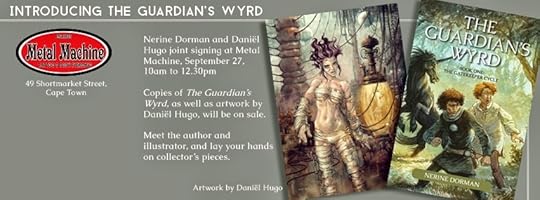
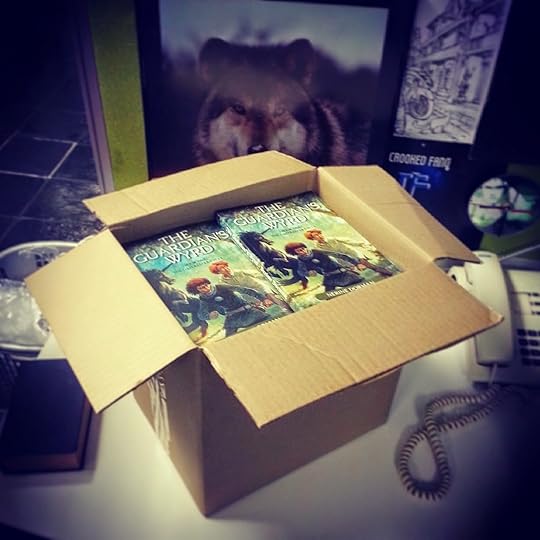
While it's darn satisfying releasing a new novel out in the wilds, nothing quite beats holding a print version in one's grubby mitts, and I've worked long and hard to bring you the dead-tree version of The Guardian's Wyrd , which was initially released by Wordsmack as an ebook. So, if you can't make my book launch, and you're yet to read the book, I urge you to support this wonderful South African SFF epublisher. Without them this book wouldn't be half as good as it is now (thank you, Kim McCarthy, you're an awesome editor).
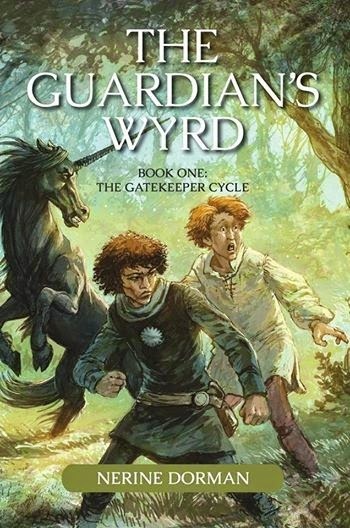 But back to the launch event. I was chatting to my illustrator, Daniël Hugo, and he was keen on the idea that we set up a joint signing so that folks can get copies of the novel, in addition to some of Daniël's other artwork, and get stuff signed.
But back to the launch event. I was chatting to my illustrator, Daniël Hugo, and he was keen on the idea that we set up a joint signing so that folks can get copies of the novel, in addition to some of Daniël's other artwork, and get stuff signed.So I've printed off a box of books (as it appears in this blog) and we'll be at Metal Machine in the Cape Town CBD on September 27 between 10am and 12.30pm. If you're in town on the day, do swing past to say hi, get a biscuit and pick up your print copy. It's going to be really chillaxed, so I'm not going to talk in funny voices or do a reading or anything.
But we will be shooting the breeze and having a few laughs, and generally just enjoying the fact that we've unleashed another good book.
Please RSVP at the Facebook event so I know how many snacks to get hold of.
Published on September 15, 2014 12:12
September 11, 2014
If it sounds too good to be true…
An author recently mailed me to warn me off a certain publisher because they were a crook. So I did a little digging, and it didn't take me longer than a minute to discover that said author's publisher was a notorious vanity press.
 But I'd like to point out this salient fact: it took me less than a minute to call up the information I needed on my cellphone. At the time I had been sitting in my car parked outside a shopping centre. It is *that* quick and easy to do a background check, folks. And it's been so for years, thanks to our friend Google.
But I'd like to point out this salient fact: it took me less than a minute to call up the information I needed on my cellphone. At the time I had been sitting in my car parked outside a shopping centre. It is *that* quick and easy to do a background check, folks. And it's been so for years, thanks to our friend Google.
So, for those of you who're not in the know… What is a vanity press, you might ask… Here's the rub: any "publisher" that offers to bring out your book but then charges you, the author, for that pleasure, is a vanity publisher. These companies fool unsuspecting authors into parting with hundreds, if not thousands of clams – with all sorts of heartache attached to the aftermath.
Here's the thing. A publisher (generally) *should* have an idea of what novels will sell to readers. They will solicit and accept submissions, and contract works that they deem as having merit.
The publisher will then pay professionals to edit a book and design the cover. The publisher is naturally going to be picky about what they will bring out, therefore they will only offer a contract on high-quality content. (In a perfect world, that is.) They are, of course, taking a calculated risk that they will sell enough copies of said novel in order to recoup their costs.
And the vanity publisher? Let me tell you, the vanity publisher doesn't give a warthog's left testicle about the quality of the writing. Why? Because the author is the one throwing the money at the publisher, and the publisher is going to tell the author her dog's runny turds do in fact taste like a double-thick chocolate Oreo milkshake.

Here are a few links on the old interwebz…
It's a scam…
What you should know…
Or this…
Now while in theory, companies that offer legitimate services to self-publishing authors, such as editing, design and layout aren't necessarily a bad thing – these folks, if they're charging reasonable, industry-relevant rates, take a huge load off. But I don't think these sorts of service providers should ever fool themselves (and others) into thinking that they're an actual, honest to dogness publisher.
If in doubt, remember this: money should always flow to the author; not the other way round.
At the heart of the matter, the onus is on you, the author, to do a thorough background check on every agent, editor and publisher you decide to entrust your work to. As I keep telling everyone, Google is your friend.
The first place I stop is a useful site called Preditors and Editors. After that, I run a search on the Absolute Write forums which will often deliver up to date information from your peers. This entire site is a goldmine. Last, but not least, there's Writer Beware.
These resources are freely available. Use them. Don't use them. But don't come crying to the interwebz if you get schnaaied and you didn't do your homework.
To finish off, I'd like to remind you that if someone is offering you something that sounds far too good to be true, it probably is. You spent months, if not years of your life working on your manuscript. What's an hour or two spent on research to make sure you find a good home for your story?
 But I'd like to point out this salient fact: it took me less than a minute to call up the information I needed on my cellphone. At the time I had been sitting in my car parked outside a shopping centre. It is *that* quick and easy to do a background check, folks. And it's been so for years, thanks to our friend Google.
But I'd like to point out this salient fact: it took me less than a minute to call up the information I needed on my cellphone. At the time I had been sitting in my car parked outside a shopping centre. It is *that* quick and easy to do a background check, folks. And it's been so for years, thanks to our friend Google.So, for those of you who're not in the know… What is a vanity press, you might ask… Here's the rub: any "publisher" that offers to bring out your book but then charges you, the author, for that pleasure, is a vanity publisher. These companies fool unsuspecting authors into parting with hundreds, if not thousands of clams – with all sorts of heartache attached to the aftermath.
Here's the thing. A publisher (generally) *should* have an idea of what novels will sell to readers. They will solicit and accept submissions, and contract works that they deem as having merit.
The publisher will then pay professionals to edit a book and design the cover. The publisher is naturally going to be picky about what they will bring out, therefore they will only offer a contract on high-quality content. (In a perfect world, that is.) They are, of course, taking a calculated risk that they will sell enough copies of said novel in order to recoup their costs.
And the vanity publisher? Let me tell you, the vanity publisher doesn't give a warthog's left testicle about the quality of the writing. Why? Because the author is the one throwing the money at the publisher, and the publisher is going to tell the author her dog's runny turds do in fact taste like a double-thick chocolate Oreo milkshake.

Here are a few links on the old interwebz…
It's a scam…
What you should know…
Or this…
Now while in theory, companies that offer legitimate services to self-publishing authors, such as editing, design and layout aren't necessarily a bad thing – these folks, if they're charging reasonable, industry-relevant rates, take a huge load off. But I don't think these sorts of service providers should ever fool themselves (and others) into thinking that they're an actual, honest to dogness publisher.
If in doubt, remember this: money should always flow to the author; not the other way round.
At the heart of the matter, the onus is on you, the author, to do a thorough background check on every agent, editor and publisher you decide to entrust your work to. As I keep telling everyone, Google is your friend.
The first place I stop is a useful site called Preditors and Editors. After that, I run a search on the Absolute Write forums which will often deliver up to date information from your peers. This entire site is a goldmine. Last, but not least, there's Writer Beware.
These resources are freely available. Use them. Don't use them. But don't come crying to the interwebz if you get schnaaied and you didn't do your homework.
To finish off, I'd like to remind you that if someone is offering you something that sounds far too good to be true, it probably is. You spent months, if not years of your life working on your manuscript. What's an hour or two spent on research to make sure you find a good home for your story?
Published on September 11, 2014 12:49



